

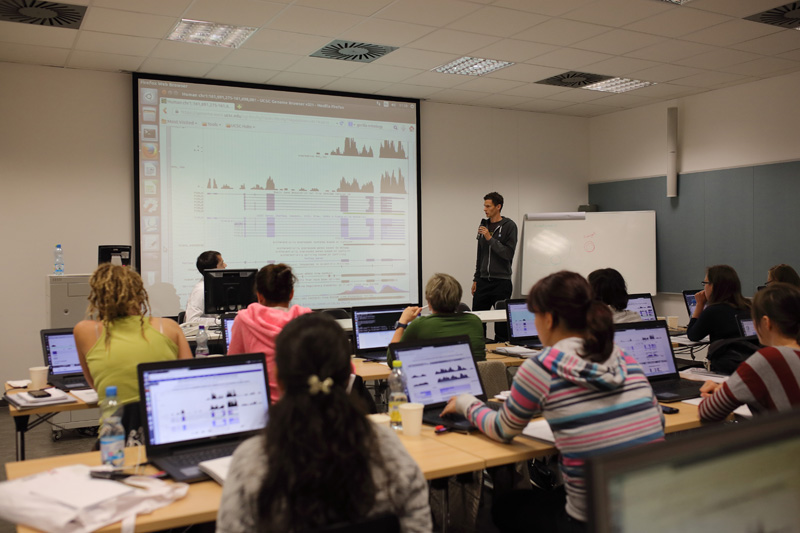
The purpose of this intense one week summer course is to get a deep understanding in Next-Generation Sequencing (NGS) with a special focus on bioinformatics issues. Advantages and disadvantages of current sequencing technologies and their implications on data analysis will be discovered. You will be trained on understanding NGS data formats and handling potential problems/errors therein. In the summer school we will use a real-life RNA-seq dataset from the current market leader illumina.
All students will be enabled to perform important first tasks of NGS data analysis themselves. The layout of the summer school has been adapted to the needs of beginners in the field of NGS bioinformatics and allows scientists with no or little background in computer science to get a first hands-on experience in this new and fast evolving research topic.
In the evenings there will be social events, like a conference dinner, or a guided city tour through Berlin. These are always great networking possibilities.
Read our detailed course program.
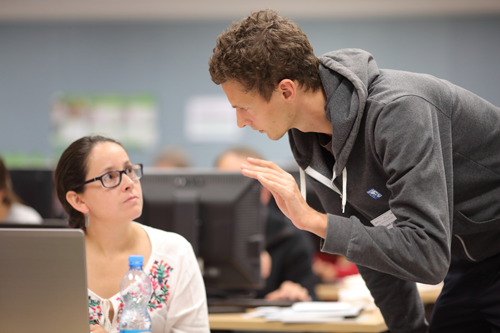

University
Prof. Dr. Helene Kretzmer (Hasso-Plattner-Institut)

Research Facility
Dr. Jan Ewald (ScaDS.AI)
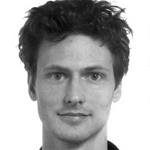
Dr. Gero Doose (ecSeq Bioinformatics GmbH)
Gero found and published several circularized RNAs in various RNA-Seq experiments. He specialized on split-read analysis some years ago and has a strong expertise in downstream analyses. Publications
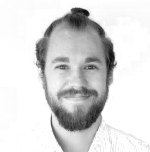
Dr. Adam Nunn (ecSeq Bioinformatics GmbH)
Adam is an expert bioinformatician skilled in developing data analysis pipelines. He specializes in whole genome DNA-Seq, de-novo genome assemblies, bulk RNA-Seq, and single-cell RNA-Seq. Adam's expertise enables him to extract valuable insights from complex datasets, unraveling gene expression patterns. Publications
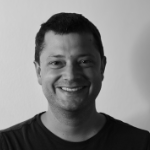
Dr. David Langenberger (ecSeq Bioinformatics GmbH)
David started working with small non-coding RNAs in 2006. Since 2009 he uses NGS technologies to investigate these short regulatory RNAs as well as other targets. He has been part of several large NGS projects, for example the International Cancer Genome Consortium (ICGC). Publications
The target audience is biologists or data analysts with no or little experience in analyzing NGS data. A fundamental understanding of molecular biology (DNA, RNA, gene expression, PCR, ...) is assumed.

Location: PC-College, Stresemannstraße 78, 10963 Berlin, Germany
Language: English
Available seats: 30 (first-come, first-served)
Registration Fee: 1,549 EUR (excluding VAT)
Travel expenses and accommodation are not covered by the registration fee.
Opening Date of Registration: October 1, 2024
Closing Date of Registration: June 1, 2025
Workshop: June 30 - July 4, 2025 (9 am - 5 pm)
"Excellently structured and polished workshop! The material was challenging but the way it was presented made it easy to follow and fun to engage with. The tutors made the learning environment really friendly and safe, and I got much more out of this workshop than I initially expected. Thank you!" Antonina Karakostova, University of Copenhagen, Denmark
"The course provided an excellent introduction to the analysis of NGS data and covered the most relevant aspects in a well-structured and comprehensible way. The trainers did a really great job guiding us step-by-step through the NGS data analysis workflow and providing theoretical background information and lots of hands-on experience. Overall, a very informative and well-organised course - clear recommendation!" Thomas Wulff, Max Planck Unit for the Science of Pathogens, Germany
The course was dense, well paced, but no stone was left unturned, particularly for statistics and "black boxes", which I particularly enjoyed. Organisation was very good, as well. The wit and expertise of the instructors made this the best such course I have so far attended." Alex Tomazatos, Bernhard Nocht Institute for Tropical Medicine, Germany
When you register for this workshop you are agreeing with our Workshop Terms and Conditions. Please review them before you register.

ecSeq Bioinformatics GmbH
Sternwartenstr. 29
D-04103 Leipzig
Germany
Email: events@ecSeq.com